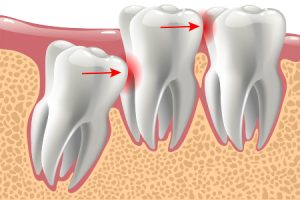
Why Wisdom Teeth Need to Go
Wisdom teeth are the largest teeth in your mouth, and the very last to come in. When they do, they can cause problems for the surrounding teeth, a condition we call impacted.
Back in the day, before modern dentistry, people didn’t take good care of their teeth. It was fairly common for people to lose one or more, even before early adulthood. When that was the case, it made sense that we had an extra set of molars. Now, (thankfully) with dental cleanings, fluoride, and effective treatment to fill cavities and fix teeth, most people keep their original set of teeth for far longer than ever before.
That’s a good thing, but it causes some problems for the wisdom teeth. There just isn’t any room to accommodate them, but they insist on pushing their way through. When this happens, they can disrupt the other teeth, causing pain and potential alignment problems. Instead, extracting wisdom teeth is often recommended before any of this occurs. We may do this directly in our office, or (for more complicated cases), we will provide a referral to an excellent oral surgeon.
In any case, we will be the first to spot potential wisdom teeth problems, usually noticed during checkups and X-rays. We will keep an eye on their development and let you know when they may need extraction.
Other individuals may have room in their mouth for wisdom teeth; however, these extra molars can present other problems. Because they are so far back in the mouth, they are hard to reach and adequately clean when brushing and flossing. In turn, this hygiene problem means they are more prone to cavities and decay, and we notice this first hand in our office. Often, these wisdom teeth end up needing extraction at a later date.
So, during your appointment, if we see that your brushing could use some improvement, we will be sure to let you know. Don’t take offense; we are just looking out for the best interest of your oral health!
